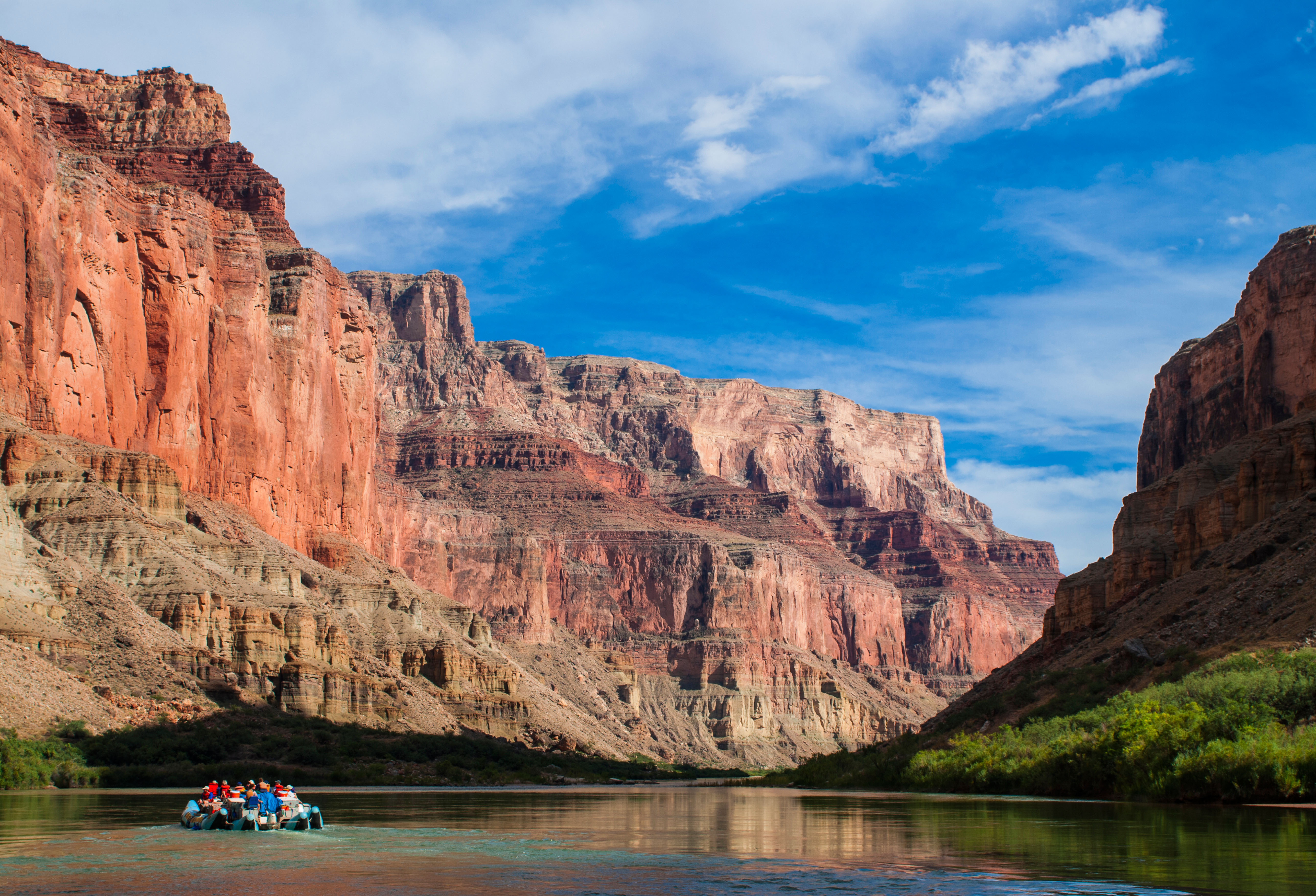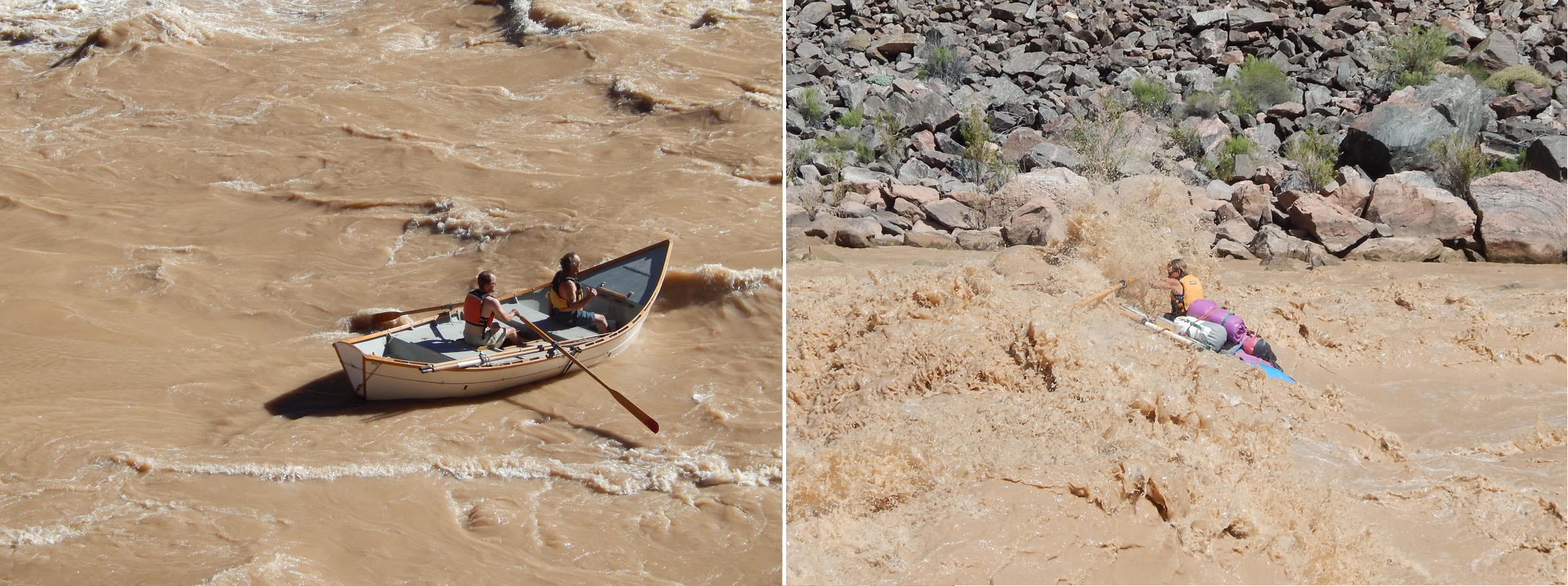The zen of American river rafting
Why floating down a river might be the ultimate vacation


A free daily email with the biggest news stories of the day – and the best features from TheWeek.com
You are now subscribed
Your newsletter sign-up was successful
Floating down a river might be the ultimate vacation. It's also not for the faint of heart.
Rafting is sort of an elaborate simulacrum of a pre-industrial state of nature. All your clothes, food, and cooking gear has to be packed on the boats. You sleep in a tent, or simply on the ground. A steep canyon means virtually no cell phone reception — and spectacular cliffs and scenery. You sleep with the sun, going to bed when it's dark and getting up when it gets light.
It's all the remoteness and self-sufficiency of backpacking, but you can carry far more stuff (for example, a big cooler full of drinks). You connect with nature in a very real way while enjoying a frankly absurd level of comfort. But there's also not an insignificant element of danger.
The Week
Escape your echo chamber. Get the facts behind the news, plus analysis from multiple perspectives.

Sign up for The Week's Free Newsletters
From our morning news briefing to a weekly Good News Newsletter, get the best of The Week delivered directly to your inbox.
From our morning news briefing to a weekly Good News Newsletter, get the best of The Week delivered directly to your inbox.
I should mention that I'm a little biased. Both of my parents were once professional river guides, running wooden dories for environmentalist legend Martin Litton down the Colorado River through Grand Canyon. They met on a commercial trip, when my dad was a guest boatman angling for a permanent job and my mom was working as a cook. He was two hours late at the start, but redeemed himself in my mother's eyes when somebody dropped the firepan in the river and he did a perfect swan dive after it into the frigid water. He rescued the pan and got the job. A bit later, my mother would become only the second woman ever in Grand Canyon to become a professional dory guide.

With parents like mine, I've been running rivers literally since before I was born — at 5 months pregnant with me, my mother swam the notorious Crystal Rapid in Grand Canyon when her friend flipped the boat. At 4 years old, I ran the Dirty Devil in an inflatable Metzeler canoe with my parents. My dad, a skilled carpenter, made me my own little wooden paddle so I could help out. At 14, I ran the Grand Canyon for the first time, and got to swim Crystal for myself when my mom flipped my sister and me once more. At 17, I rowed my own boat through the canyon, again with my mom. (I didn't flip that time, but got close enough once that we both fell into the river.) In between were a slew of trips on the Snake, the Yampa, the Arkansas, the Green, the Colorado, the San Juan, the Dolores, the Rogue, the Grand Ronde, the Zambezi, and others.
But on each of those trips, somebody had to personally navigate each boat down the river. That is no small task.
In order to row a whitewater boat, you must be able to anticipate where you want to be and how to get there. Rivers are not straight, and there are constant changes in the current, from water boiling up from the bottom to eddies where the current goes upstream for a moment. These changes in the current are visible on the river surface through patterns of movement and ripples, allowing you to predict what will happen. With a bit of practice, you can learn to "read" the water, and know where to go and what to avoid. With a lot of practice, you get a intuitive feel for the water — knowing instinctively when to stroke slightly harder on one side, when to gently drag one oar, when to twist the oar handle to keep a wave from knocking it out of your hand, and so on.
A free daily email with the biggest news stories of the day – and the best features from TheWeek.com
All this comes together in the rapids, the most dangerous and exciting part of the trip. Rivers slowly descend on their way from the ocean to the mountains — but are often blocked up by debris flows from flooding side canyons, leading to short, steep drops. Rocks in the stream bed create obstacles in the rapid, either sticking fully out of the water or below the surface. The latter variety are either barely below the surface, creating "pourovers," or a bit further down, creating a "hole," a permanent standing wave where the river folds back on itself.
Skill in reading water can allow you to pick a route through the rapid, but should you make a mistake, you're liable to get the boat stuck on a rock, or flip it over in a hole.
That flip in Crystal 16 years ago remains to this day the single most violent experience of my life. The boat was sideways, and I was on the downstream side, so when we hit the big hole, I got several tons of water smashed right in the chest. My sunglasses and shoes were gone in an instant. A quarter-second later, I got sucked under the boat at high speed, bouncing along the rigging, which tore a huge chunk of flotation out of my life jacket and sliced open my head right above my right eye. Luckily, there was a doctor on the trip, who taped it shut with a butterfly bandage, leaving my eye half-closed for the next week. For the rest of the trip, they called me "one-eyed Jack."
That experience weighed on my mind this summer when I began a trip down the Salmon River with my mother. Usually my dad would accompany us on this kind of trip, but he had another booked, so this time it was just the two of us. Lots of rowing tends to make her arthritis act up these days, so I took the oars.
At first, the boat felt a bit unfamiliar and awkward. I kept failing to predict exactly where the river would take me, and having to rely on my strength to get into the right place. Muscle is useful on the river, but it can also be a crutch. The mark of real skill is efficiency of effort — being able to put the boat precisely where it needs to be without seeming to work for it. I was flailing by comparison.
But after a few days, it started coming back. At a certain point, everything clicked back together, and moving the boat became a simple instinct, like an extension of my body. I am too much of a dilettante to be a real expert in anything, but I've been rowing whitewater since I was born. Relative to the average, I'm better at that than I am at anything else.
That experience of mastery — put towards successfully navigating real danger — all in a gorgeous setting, plus good company, is what a river trip is all about.
Ryan Cooper is a national correspondent at TheWeek.com. His work has appeared in the Washington Monthly, The New Republic, and the Washington Post.
-
 Political cartoons for February 22
Political cartoons for February 22Cartoons Sunday’s political cartoons include Black history month, bloodsuckers, and more
-
 The mystery of flight MH370
The mystery of flight MH370The Explainer In 2014, the passenger plane vanished without trace. Twelve years on, a new operation is under way to find the wreckage of the doomed airliner
-
 5 royally funny cartoons about the former prince Andrew’s arrest
5 royally funny cartoons about the former prince Andrew’s arrestCartoons Artists take on falling from grace, kingly manners, and more
